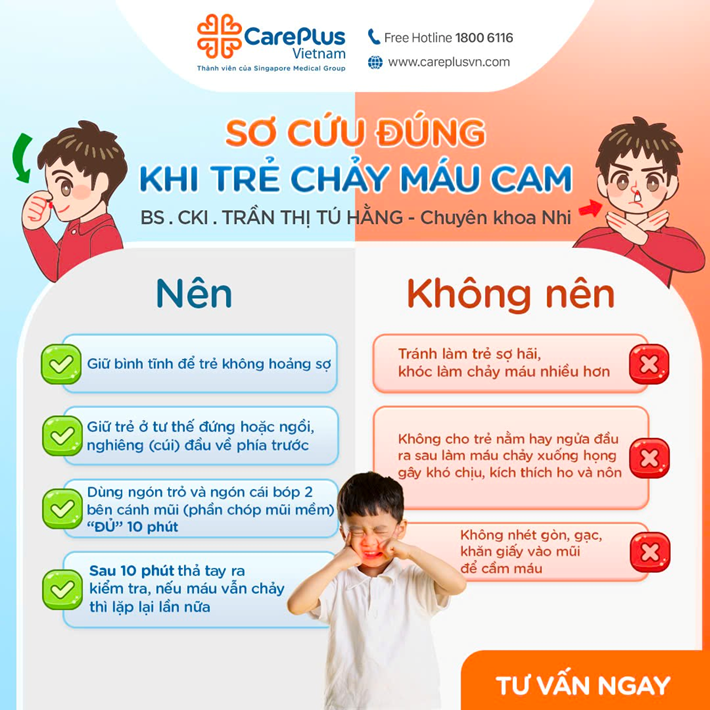NOSEBLEEDS: CAUSES, FIRST AID, AND PREVENTION
Nosebleeds are a common occurrence, especially in young children. Preschoolers may experience at least one nosebleed. While usually not serious, it can be quite concerning for parents.

12/16/2024 9:30:17 AM
Causes
Nosebleeds can happen for various reasons, including:
-
Colds, infections, or allergies: These can cause nasal membranes to swell and become more prone to bleeding.
-
Injury: Habitual nose-picking, rubbing, inserting foreign objects, blowing the nose too hard, or physical impact (like bumping into something or a fall) can lead to nosebleeds.
-
Low humidity or dry weather: These conditions, along with exposure to irritants like smoke, can dry out nasal membranes.
-
Structural abnormalities or growths: These may include benign tumors or polyps.
-
Blood clotting disorders: Conditions affecting clotting, such as medications, platelet deficiencies, or clotting factor issues, can increase the risk of nosebleeds.
-
Chronic illnesses requiring long-term medication or oxygen therapy.
First Aid
Many misconceptions exist about how to handle a nosebleed. Here’s what you should and shouldn’t do:
What to Do:
-
Stay calm: Caregivers often feel alarmed when a child has a nosebleed, but it’s important to remain composed so the child doesn’t become scared. Nosebleeds are rarely severe.
-
Position the child upright or seated, tilting their head slightly forward.
-
Pinch the soft part of the nose: Use your thumb and forefinger to firmly squeeze both nostrils together for a full 10 minutes without letting go to check. After 10 minutes, release and see if the bleeding has stopped. Repeat once if necessary.
What Not to Do:
-
Panic: This can frighten the child and increase crying, which may worsen the bleeding.
-
Lay the child down or tilt their head back: This can cause blood to flow into the throat, leading to coughing, gagging, or vomiting.
-
Insert objects like cotton, gauze, or tissues into the nose to stop the bleeding.
When to See a Doctor
Seek medical attention if:
-
The bleeding doesn’t stop after 20 minutes of applying pressure.
-
Nosebleeds occur frequently or repeatedly.
-
The bleeding is heavy or fast.
-
A nosebleed follows an injury.
-
The child appears pale, sweaty, or unresponsive.
-
Blood is coming from the mouth, or the child is coughing or vomiting blood (resembling coffee grounds).
-
You suspect the child has inserted something into their nose.
-
They bruise easily or bleed excessively from minor injuries.
-
A new medication was recently started.
Prevention
To minimize the risk of nosebleeds:
-
Keep nasal passages moist: Use saline drops or sprays to hydrate the nasal lining, especially for children prone to colds, nasal congestion, or allergies.
-
Ensure adequate hydration: Encourage drinking of enough water.
-
Avoid injuries: Teach children to be cautious to prevent bumps and falls.
-
Use a humidifier: In cold or dry climates, a humidifier can add moisture to the air. Be sure to clean it regularly to prevent bacteria and mold growth.
By following these tips and knowing how to manage a nosebleed, you can handle this common issue with confidence and ease!